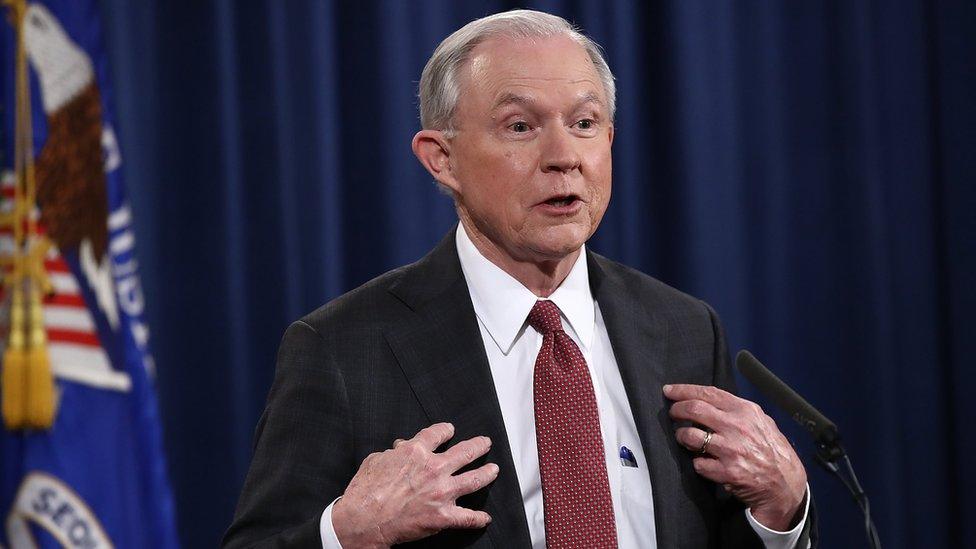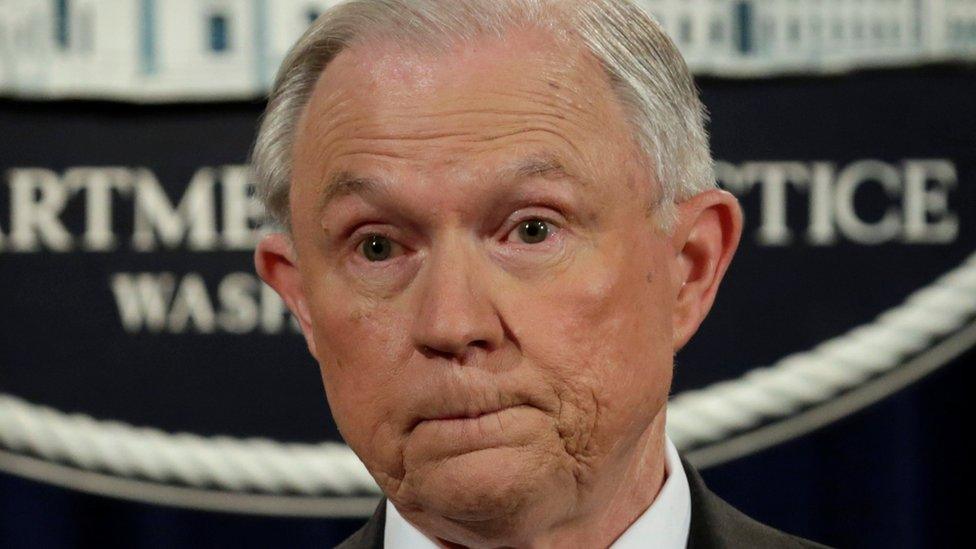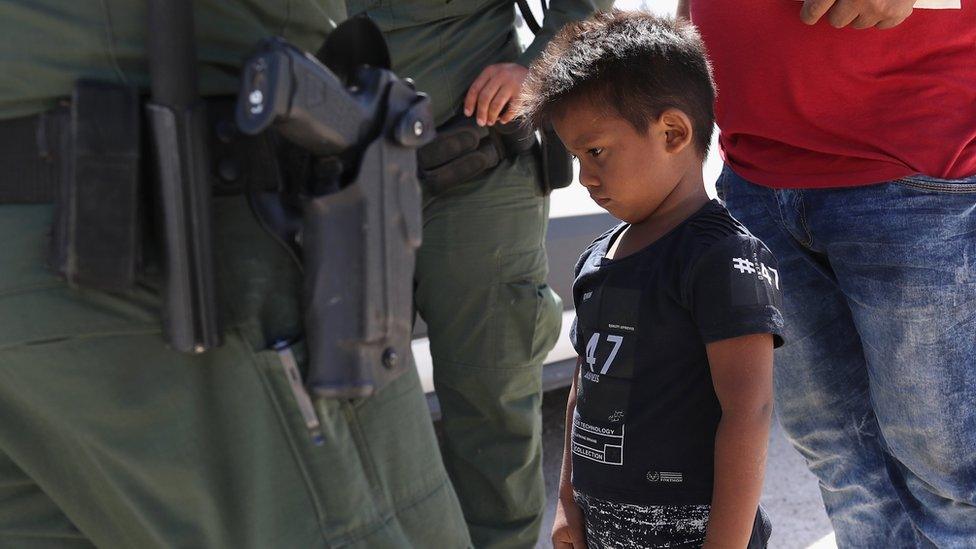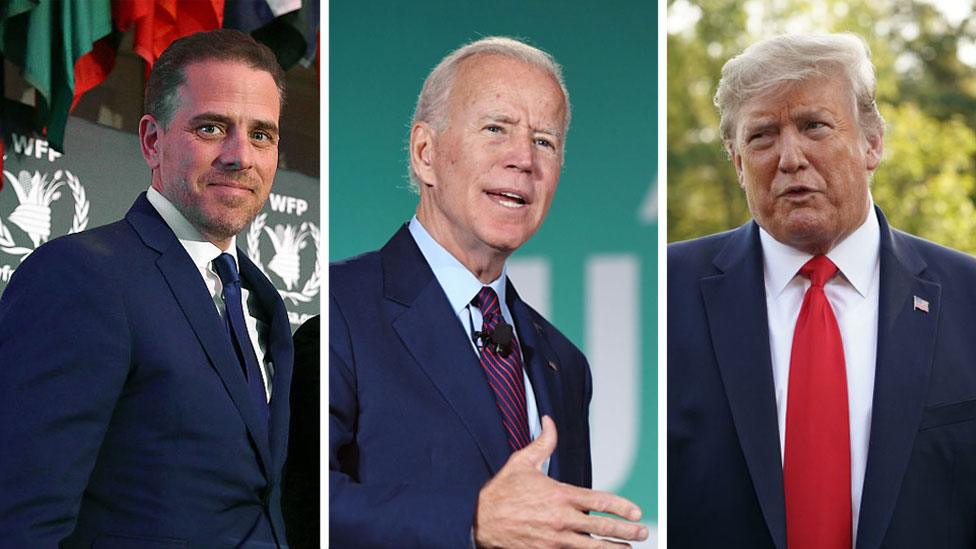Jeff Sessions: The ex-attorney general 'making a political comeback'
- Published

Jeff Sessions has continued to publicly back the US president since stepping down as attorney general last year
Former US Attorney General Jeff Sessions is planning a political comeback, entering the race for his old Senate seat in Alabama.
The 72-year-old is popular among Republicans in the state, having previously held the seat for 20 years.
He gave up the role to become US President Donald Trump's first attorney general, but was forced to step down after their relationship soured last year.
Mr Sessions is a controversial figure, who has come under fire from Democrats over his hard-line views on immigration and allegations of racist remarks.
This is what you need to know about the veteran politician.
Becoming attorney general
Born Jefferson Beauregard "Jeff" Sessions III, he is a lifelong Republican who worked as a lawyer and served in the US Army reserves before entering the political stage.
He became attorney general in Alabama - his home state - in 1994 and joined the Senate two years later.
During his 20 years in the Senate, he sat on the Armed Services Committee, the Judiciary Committee and the Budget Committee.
Mr Sessions was the first Republican senator to publicly endorse Mr Trump in the 2016 presidential race. As a key loyalist, he was a senior adviser to the New York tycoon on politics, national security and policy, and was vice-chairman on the Trump presidential transition team.
He resigned from the Senate in 2017 to become US President Donald Trump's first attorney general.
The KKK joke
But his appointment to the role was dogged by allegations of racism.
His opponents noted that a Senate committee had denied Mr Sessions a federal judgeship in 1989 after lawmakers heard testimony that he had used a racial slur. He had also joked about the Ku Klux Klan, saying he thought they were OK until he heard they smoked marijuana.
In a separate incident, he was accused of calling a black assistant attorney "boy" and telling him to be careful about how he spoke to "white folks".

Jeff Sessions was appointed attorney general in 2017
Mr Sessions has said the allegations that he once supported the KKK were "damnably false", and he has denied making the comments to the assistant attorney. He also rejected claims that he once labelled the National Association for the Advancement of Colored People "un-American".
His supporters defended him, pointing to his votes to extend the Voting Rights Act and to award the Congressional Gold Medal to Rosa Parks.
The National Rifle Association (NRA) also supported his appointment, citing his pro-gun voting record, and many in the law enforcement community said they saw him as a strong advocate for police.
Stalwart defender of Trump
During his time as attorney general, Mr Sessions supported the president's position on key policies.
In May 2018, he announced a "zero-tolerance" approach to immigration, which saw many adults trying to cross the border separated from their children as they were placed in custody and faced criminal prosecution for illegal entry.
Mr Sessions defended the separations on multiple occasions.
"Our policy that can result in short-term separation of families is not unusual or unjustified," he said at an event in Indiana, where he quoted Bible scripture to back up his point.

The separation of migrant families drew widespread criticism
He also made cracking down on violence and drugs a key focus of his time as attorney general.
As part of this, he ordered federal prosecutors to seek harsher criminal sentencing, undoing an Obama-era policy to ease prison overcrowding.
"It means we are going to meet our responsibility to enforce the law with judgment and fairness," he said. "It is simply the right and moral thing to do."
He also sought to end an Obama-era policy that shielded legal marijuana from federal prosecution.
Relations take a turn for the worse
Relations between the president and attorney general soured last year, mainly over Mr Sessions' refusal to oversee the investigation into alleged Russian meddling in the 2016 election.
Mr Sessions voluntarily removed himself from the probe after Democrats accused him of failing to disclose contacts with the Russian ambassador during his Senate confirmation hearing. He later said he had forgotten about those meetings, which happened during the 2016 election campaign.
Mr Trump publicly criticised Mr Sessions over the decision.
"I don't have an attorney general. It's very sad," he told Hill.TV in September 2018.
Jeff Sessions was an early Trump supporter, but their relationship soured long before he was asked to resign
Less than two months later, Mr Sessions resigned from the role, saying he was doing so at the president's request.
Mr Trump has since called his choice of attorney general the "biggest mistake" of his presidency.
A Republican official quoted by AP news agency said there was no indication that Mr Trump had changed his feelings towards his former attorney general amid reports that Mr Sessions is hoping to return to the Senate.
But Mr Sessions has continued to publicly back the president and his policies.
Speaking at a Republican Party fundraiser last month, he praised Mr Trump's work on trade, immigration and foreign policy.
"That's why I supported him and why I still do support him," he said, according to AP. "He is relentlessly and actually honouring the promises he made to the American people."
- Published24 July 2019

- Published6 November 2019
- Published5 February 2020
